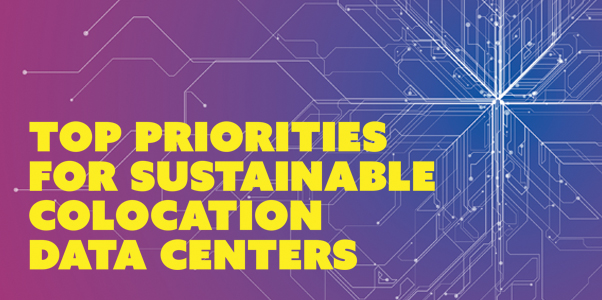
By Teddy Otero
Daily global data generation is estimated to grow to 463 exabytes by 2025. Simply keeping pace with this data surge will demand dramatically more data center capacity and connectivity than currently available. Data centers are at the crossroads of commerce, necessary to support and foster our increasingly information-hungry, interconnected world.
In response to growing concerns about the environmental impact of the flourishing data center industry, sustainability initiatives skyrocketed in recent years. However, through trial and error, colocation data center providers have uncovered challenges in implementing these initiatives. Nevertheless, when operators prioritize sustainability and seek to overcome the obstacles, data centers can contribute to a healthy global ecosystem while fulfilling their vital role in society.
A Demand for Green Data Centers
As data centers shoulder so much of our modern daily experience, they consume an estimated 3% of the global electricity supply and produce 2% of global greenhouse emissions. The industry has long pursued efficiency and sustainability as both the right thing to do and as a prudent measure to lower costs, but as awareness of the environmental impact of data centers has grown, so too has pressure on the industry to expand and measure these initiatives. This demand, stemming from regulators, customers, investors, and even employees, has led the colocation data center industry to prioritize comprehensive sustainability projects. Technological advances and renewable energy enable this dramatic shift, and colocation providers must encourage tenants to pursue efficient IT equipment and practices. However, significant challenges such as the climbing costs of renewable energy and supply chain snarls have slowed the process.
Undeterred, intrepid colocation data center providers are finding workarounds and alternate solutions to achieve their sustainability priorities.
Sustainability Priorities for Colocation Data Centers
In the last decade, data centers have made considerable strides in efficiency. Today, most facilities can cool IT equipment and provide auxiliary services using less than 40% of the IT load itself. While data center design and equipment will continue to drive efficiency improvements, new sustainability priorities such as renewables, emissions, and water use have emerged.
While not unique to data centers, the demand for organizations to commit to clean energy is at an all time high. For example, Microsoft has pledged to source all of its data center energy from renewable sources by 2025 and promised net-zero carbon emissions by 2030. While solar and wind power come with intermittency challenges, they are emission-free, like reliable hydroelectric and nuclear power.
Toward that end, colocation data center providers are diving deep into their greenhouse gas (GHG) emissions and committing to the year they plan to reach net-zero carbon emissions. Emissions fall into three scopes that colocation operators need to be familiar with as they move to address them:
Additionally, sustainably-minded data center providers are conscious of the water their cooling systems consume, which can be as much as 7.1 cubic meters of water for every 1MWh of energy. So, regardless of drought conditions, they prioritize minimizing water use and recycling used water for landscaping and agriculture. Many operators are also planning ahead for emerging liquid cooling techniques that will further reduce water usage.
Setting these new priorities allows colocation operators to take great strides toward minimizing the environmental impact of their critically-important services. A commitment to innovation will help them overcome the challenges and reduce the expense of pursuing a significant ecological contribution.
Additional Tactics for Sustainable Data Centers
From a data center’s inception, designers, builders, and operators are developing tactics from all sides to compensate for the sheer energy required to store, process, and serve such massive amounts of data.
Climate and geological considerations are made during site selection to minimize environmental impact. Recently developed materials and techniques reduce emissions and waste during data center construction. Supply chains and vendors are evaluated and optimized for sustainability, and operators work with local municipalities and communities to further mitigate environmental footprints.
Colocation operators can also support the development of policies and regulations that will enable them to achieve greater sustainability. Educating policymakers on the importance of data centers is a critical first step, followed by advocating for policies that incentivize energy efficiency, renewable energy, water conservation, and waste reduction. The environment benefits directly from these efforts, but so do politicians, constituents, data center operators, and tenants.
Providers should encourage their tenants to utilize energy more efficiently by regularly updating their deployments’ IT equipment and aggressively consolidating unnecessarily duplicated IT equipment and virtual environments. Data center operators’ challenges in achieving greater sustainability are significant but not insurmountable. The right policies and a commitment to innovation will allow data center operators and customers to overcome these obstacles and make a substantial impact.
The Future of Data Center Sustainability
Thankfully, the construction of energy-efficient colocation data centers powered by renewable energy is a global trend. Rapidly expanding renewable energy markets allow more colocation providers to sign energy agreements that allocate for net new renewable energy creation. In addition, large technology companies like Google are pushing the envelope by investing heavily in renewable energy projects.
Hybrid IT, edge computing, artificial intelligence, and data creation are driving astronomical demand in the data center market worldwide, and favorable government programs are emerging in response. As a result, tax rebates and subsidies will increase, especially in Europe and North America, and sustainability attached.
The future of data center sustainability looks promising. Enterprises are increasingly committed to partnering with sustainably-minded providers, driving a new focus on data center innovations. As a result, energy usage, emissions, water consumption, and waste are declining while efficiency, cost-effectiveness, and environmental health are all on the rise.
Resources:
Teddy Otero is Director of Marketing at Sabey Data Centers. He can be reached by [email protected].